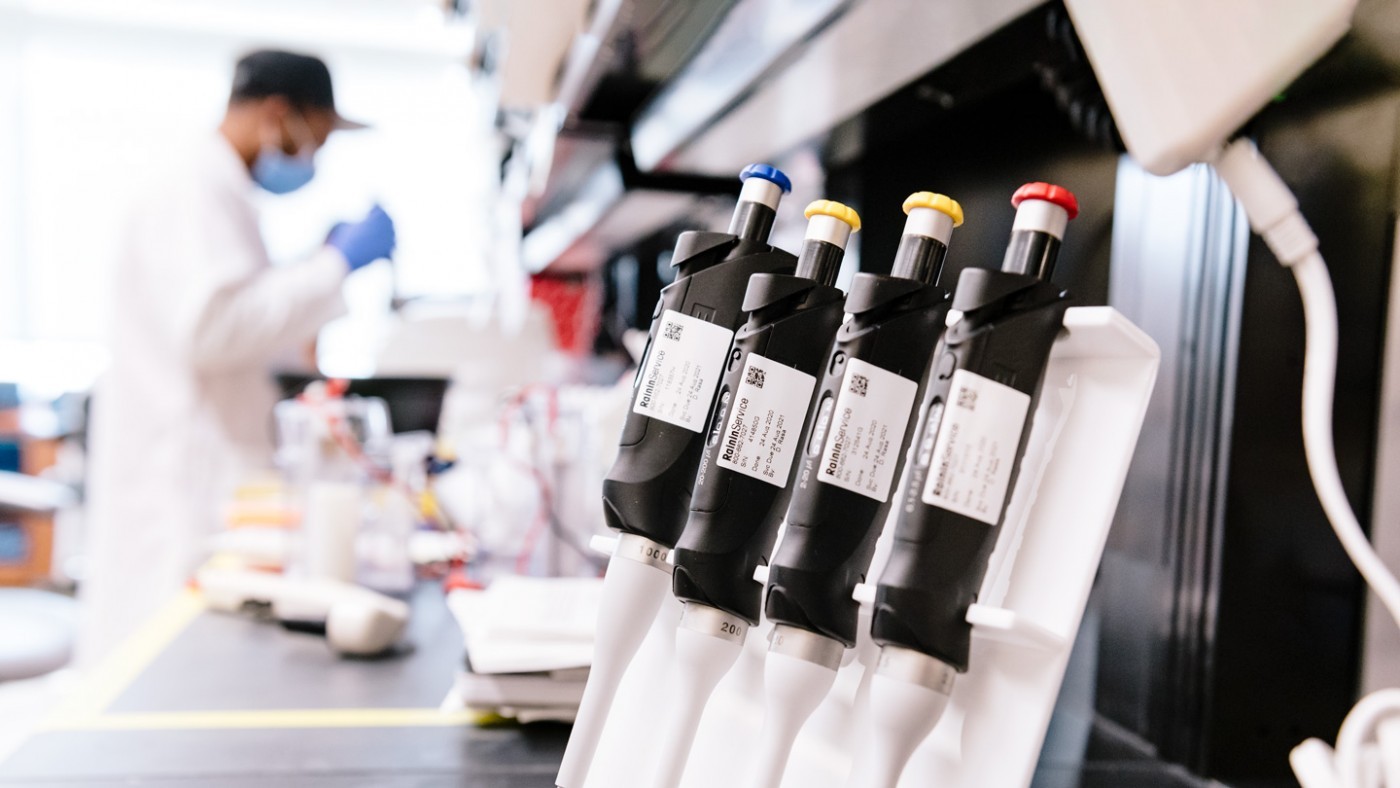Gladstone NOW: The Campaign Join Us on the Journey✕

Gladstone virology expert Warner Greene explains why you should get your flu shot this year.
With the flu season approaching in the United States, many schools, universities, and organizations—including Gladstone Institutes—are requiring their students and employees to get the flu shot this year. Warner Greene, MD, PhD, senior virologist at Gladstone, explains why this is so important, even if you’re not required to do so.
What’s the risk of COVID-19 converging with the flu this winter?
The coalescence of two major respiratory pathogens, COVID-19 and influenza, will certainly add stress to our health care system. We’re anticipating a resurgence of COVID-19 this fall and winter, because respiratory viruses tend to come back and spread as people spend more time indoors.
While it’s true that wearing a face mask to protect yourself from COVID-19 may also prevent the spread of the flu, the flu vaccine is still the best option to effectively manage both viruses.
How can getting a flu shot help the situation?
The overriding reason to get a flu vaccine is to lessen the demand for hospitalization related to influenza. The flu shot may not completely prevent you from getting the flu, but it can certainly attenuate the clinical course of the flu.
For the 2018 to 2019 flu season, the flu vaccine prevented 58,000 hospitalizations and 2.3 million medical visits in the United States. The more we can leave hospital beds available for patients with severe cases of COVID-19, the more we can prevent overwhelming hospitals and health care workers.
Can a flu shot also help protect you against COVID-19?
Yes, and that’s another reason you should get a flu shot. The influenza vaccine has positive side effects on the innate immune response that have been found to be protective against COVID-19.
In a recent study shared on medRxiv, a group of Swiss and Brazilian scientists reviewed the records of 92,000 people who had been diagnosed with COVID-19. They found that people who had received the flu vaccine—because our summer is flu season in Brazil—had, on average, an 8 percent lower chance of needing intensive care treatment, an 18 percent lower chance of needing invasive respiratory support, and a 17 percent lower chance of dying due to COVID-19.
So, clearly, the flu shot boosts the innate immune response in ways that can be helpful for fighting off COVID-19 or making a bad infection less serious.
Should you wait until later in the season to get your flu shot?
Some experts have recommended waiting until later in the year to get a flu shot, to prevent waning immunity and make sure you’re protected through the end of the flu season. However, this year in particular, I hope there will be a much higher demand for the influenza vaccine. And if that’s the case, some providers may run out of their vaccine supply. I would err on the side of getting vaccinated while the flu vaccine is available.
Why are some organizations, like Gladstone, requiring flu shots this year?
Only about 30 to 40 percent of American adults get the flu vaccine every year. That’s embarrassingly low.
2018–2019 proved to be only a moderately severe flu season, yet 490,000 people still required hospitalization and 34,200 people died from this preventable infection. Now, as we face the combined threat of two respiratory viruses, a flu shot makes so much sense both for the person getting vaccinated and for society. We should be taking every step possible to protect ourselves and lessen the strain on our health care system.
Can you take any extra precautions if you are a senior?
It’s recommended for individuals over the age of 65 to receive the higher dose of the flu vaccine, which contains more protective antigens. The reason that people who are older need a higher dose is that their immune response senesces, or grows old as they grow old. So, it needs a higher stimulation to get the adequate response. And that’s why I chose to get the higher dose flu vaccine!
Featured Experts
Support Our COVID-19 Research Efforts
Gladstone scientists are moving quickly to respond to the coronavirus outbreak. Help us end this pandemic.
Gladstone’s Scientific Highlights of 2025
Gladstone’s Scientific Highlights of 2025
From fundamental insights to translational advances, here’s how Gladstone researchers moved science forward in 2025.
Gladstone Experts Alzheimer’s Disease Autoimmune Diseases COVID-19 Neurological Disease Genomic Immunology Cardiovascular Disease Data Science and Biotechnology Infectious Disease Conklin LabScience in Seconds | Researchers Pinpoint Key Gene Behind Heart Defects in Down Syndrome
Science in Seconds | Researchers Pinpoint Key Gene Behind Heart Defects in Down Syndrome
In this video, Gladstone scientists share how they used stem cells, gene editing, and AI to identify a gene driving heart defects in Down syndrome—and how reducing its levels in mice restored normal heart development, offering hope for future treatments
Gladstone Experts Cardiovascular Disease Data Science and Biotechnology Pollard Lab Srivastava Lab AI Big Data CRISPR/Gene Editing Human Genetics Stem Cells/iPSCsScience in Seconds | The Thinking Microscope: Research Powered by an AI Brain
Science in Seconds | The Thinking Microscope: Research Powered by an AI Brain
In this video, Steve Finkbeiner and Jeremy Linsley showcase Gladstone’s groundbreaking “thinking microscope”—an AI-powered system that can design, conduct, and analyze experiments autonomously to uncover new insights into diseases like Alzheimer’s, Parkinson’s, and ALS.
Gladstone Experts ALS Alzheimer’s Disease Parkinson’s Disease Neurological Disease Finkbeiner Lab AI Big Data




